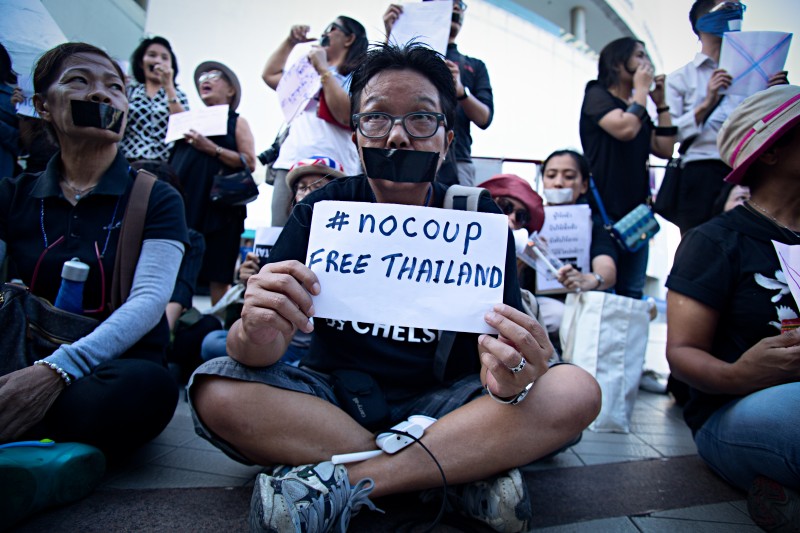
Anti-coup activists and protesters in central Bangkok. Photo by Lillian Suwanrumpha, Copyright @Demotix (5/23/2014)
Ellery Roberts Biddle, Marianne Diaz, Lisa Ferguson, Weiping Li, Hae-in Lim, Filip Stojanovski, and Sarah Myers West contributed to this report.
Global Voices Advocacy's Netizen Report offers an international snapshot of challenges, victories, and emerging trends in Internet rights around the world. This week's report begins in East Asia, where several governments are amping up Internet regulations in the name of cybersecurity—and at the cost of citizens’ rights.
Thai Prime Minister Prayut Chan-o-cha is pushing proposals for a new cybersecurity law that would grant authorities the right to access emails, telephone records, computers, and postal mail without obtaining prior court approval. Thai lawyer Dhiraphon Suwanprateep criticized the law for being “broad, vague, and too permissive.”
A Singaporean judge ruled that gay rights blogger Alex Au stood in contempt of court after he questioned the judiciary’s treatment of cases concerning gay sexual activity, which is a crime in Singapore. Although the country is not known as an “Internet enemy,” cases like Au’s highlight the government’s increasing intolerance for openness online. On a related note, Singapore will soon launch a new agency responsible for tackling cybercrime in the country.
And in China, new regulations require technology manufacturers to build back doors into their products so that government authorities can access user data with greater ease. The rules will unquestionably create new security vulnerabilities that could be exploited both by government and malicious actors alike, yet they are the first in a series of upcoming policy changes intended to “strengthen the country’s cybersecurity.”
Social media satirists under fire in Ecuador
Twitter temporarily suspended @CrudoEcuador, an account devoted to memes and satirical commentary on Ecuadorian politics, after government officials and their supporters accused the anonymous user of violating Twitter’s terms of service. Although the account has since been restored, President Rafael Correa has publicly condemned @CrudoEcuador and threatened to reveal the user’s identity. In response, activist group Fundamedios issued a statement condemning the persecution of social network users in Ecuador.
Macedonia says no to drones
The Republic of Macedonia issued a new regulation banning the use of drones within 500 meters from government buildings, public gatherings, and protests. Drone-made videos and photos on social media were instrumental in demonstrating the size of a recent mass student protest, which received barely any international media coverage but has been called the largest student protest in Macedonia in 25 years of independence.
Facebook caves to Turkish censorship order
Facebook is now blocking pages featuring the image of the Prophet Mohammed for users in Turkey, thanks to an order handed down from a Turkish court. This comes just two weeks after CEO Mark Zuckerberg expressed solidarity with the journalists killed at French magazine Charlie Hebdo and sharply criticized incursions on free speech. Turkish state broadcaster TRT reports the court threatened to ban access to the entire Facebook site if it did not comply with the order.
Latest Snowden docs reveal “badass” security gaps
New revelations from the archive of documents from the NSA released by Edward Snowden reveal a program, cheekily named BADASS, that enabled intelligence agencies in the United Kingdom and Canada to accumulate data on smartphone users’ location, app preferences, and unique device identifiers. In order to do so, the program exploited weaknesses in smartphone data that is regularly tracked by ad and analytics companies, confirming that governments are indeed taking advantage of these privacy gaps for surveillance purposes.
German regulator wags finger at Facebook
Facebook is facing investigations by privacy regulators in Hamburg, Germany, over concerns that the company’s data privacy policies may violate German law. Regulator Johannes Caspar said, “I think it’s problematic that Facebook wants to exchange user data between all of its various units, including WhatsApp and Instagram.”
Reddit shows surefire way to protect user data (don’t collect it in the first place)
Reddit published its first-ever transparency report, which revealed that it receives far fewer requests for user data than companies like Google and Facebook. This is due in part to the fact that Reddit does not collect much in the first place and permanently deletes IP addresses after 90 days.
New Research
- Freedom in the World 2015 | Discarding Democracy: Return to the Iron Fist – Freedom House
- Data Beyond Borders: Mutual Legal Assistance in the Internet Age – Global Network Initiative
- Rise Up: Revolutions – Fusion
Subscribe to the Netizen Report via email




3 comments